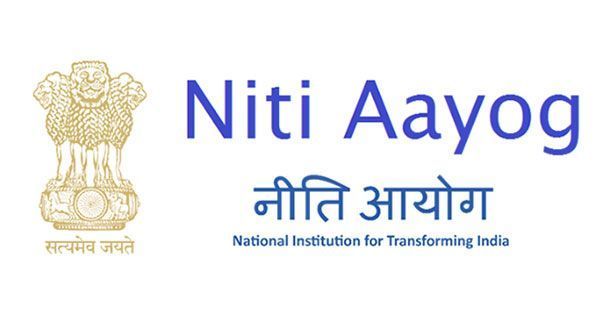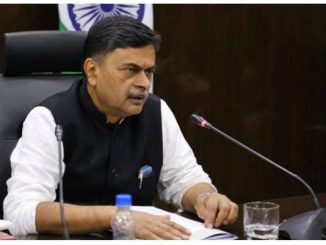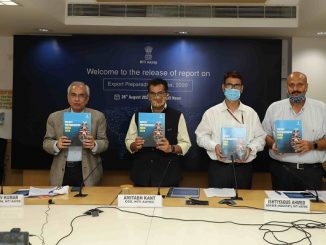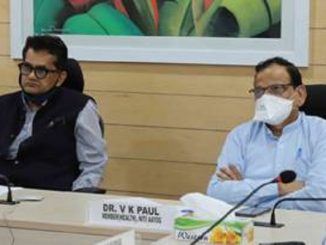
May 04: 1. As the country faces an unprecedented challenge with the Covid-19 global pandemic affecting our nation, the Empowered Group 6 (EG 6) constituted by Government of India and chaired by CEO, NITI Aayog is playing a key role in galvanizing Civil Society Organisations, NGOs and development partners, Industry partners, and International Organisations to create synergies with the Government of India.
The Empowered Committee 6 is chaired by Shri Amitabh Kant, CEO NITI Aayog, include Dr Vijayaraghavan, PSA, Kamal Kishore (Member, NDMA); Sandeep Mohan Bhatnagar (Member, CBIC); Anil Malik (AS, MHA); VikramDoraiswami, (AS, MEA); P. Harish (AS, MEA); Gopal Baglay (JS, PMO); Aishvarya Singh (DS, PMO); Tina Soni (DS, Cabinet Secretariat); and the work of EG6 is serviced by SanyuktaSamaddar (Adviser, SDG, NITI Aayog). The group has extensively engaged with CSOs, NGOs, Development partners, UN Agencies, Industry associations in over 15 meetings.
2. CSOs, NGOs and development partners: A whole of society approach in letter and spirit:
The EG6 has succeeded in galvanising a network of 92,000 CSOs/NGOs, a record of sorts, to harness their strengths and resources, expertise in key social sectors-nutrition, health, sanitation, education, and extensive reach in the community. The group has mobilised over 92,000 NGOs/CSO, appealing them to assist the State Governments and District Administrations in identifying hotspots and deputing volunteers; delivering essential services to the vulnerable, including the homeless, daily wage workers, migrants, and urban poor families; and in creating awareness about prevention, social distancing, and isolation.
All Chief Secretaries were requested to appoint State-level Nodal Officers to coordinate with all NGOs and resolve their issues apart from leveraging their resources and networks. Almost all States have appointed Nodal Officers to liaise with NGOs/CSOs.
3. Aspirational Districts Programme: Localising collectivised solutions:
The Aspirational Districts Programme piloted by NITI Aayog has been a phenomenal success in uplifting the lives of millions in 112 most backward (aspirational) districts of the country. As of now there are about 610 cases in 112 aspirational districts which is considered fairly low at less than 2% of the national level of infections. Of these six districts have reported first case after 21st April. Major hotspots are Baramula (62), Nuh (57), Ranchi (55), YSR (55), Kupwara (47) and Jaisalmer(34).
NITI Aayog has taken steps to ensure that these districts are able to contain the spread of the virus and has actively referred the requirements in testing kits, PPE & masks etc. to respective Empowered Groups for necessary action in order to address supply constraints.
4. International Organisations: Leveraging global networks for local efforts
The EG 6 has mobilised various UN Agencies and facilitated them in creating timely response action plans in coordination with various States and line ministries through intensive collaboration with the UN Resident Coordinator for India, and country heads of WHO, UNICEF, UNFPA, UNDP, ILO, UN Women, UN-Habitat, FAO, World Bank, and Asian Development Bank. The UN in India has prepared a Joint Response Plan (JRP), which has been submitted to EG 6, with prevention, treatment and essential supplies as key components.
5.Engagement with Industry and Start-ups: Private sector interventions for public good
Empowered Group 6 and NITI Aayog has become the interface for converging, collaborating and leveraging the strengths of the private sector actors to tide over this crisis by facilitating and accelerating COVID management measures including the creation of response systems in areas of health sector monitoring and tracing, non-health industry-driven solutions, relief and rehabilitation measures, and nation-wide awareness and advocacy, in addition to mitigating several challenges faced by different sectors of the industry and economy.
It has opened up cross-sectoral dialogue within the private sector and start-ups to engender collaboration and synergetic response action, apart from brainstorming suggestions to mitigate the situation across sectors, including MSME, tourism, aviation, exports and manufacturing and services sectors.
a). Role of the Private Health Care Sector: The private healthcare sector has been deeply committed in partnering the Government to fight the crisis, offering capabilities even amid the compelling situation. Manufacturing companies are coming forward and utilizing their plant, machinery and skilled manpower to mass manufacture equipment. For example, CII has launched a coalition of high-end manufacturing companies in automobile, Machine Tools and Defence sectors to mass-manufacture ventilators. This is to augment the inventory of ventilators of different classifications as the capacity of ventilator manufacturing by existing manufacturers is low and the import of ventilators is constrained. India’s manufacturing companies like Tata, Mahindra & Mahindra, Bharat Forge, Maruti Suzuki, Ashok Leyland, Hero MotoCorp, Godrej & Boyce, Sundaram Fasteners, Walchandnagar, Grasim, Hyundai, Volkswagen, Cummins etc. are moving ahead to manufacture ventilators in large quantities with some them already initiated production.
c)Start-ups and technology-driven innovations: Indian frugality at its finest
Realising that entrepreneurs and innovators across the country are quick to respond to the challenge posed by the Covid-19 pandemic, EG 6 and NITI Aayog extensively engaged with Indian Start-Ups, Start-Ups of Indians in the US and other countries to better leverage their new innovative, low-cost designs, applications, and types of equipment by linking them up with big industry platforms.
I) A host of new innovations, some emerging from start-ups that have been incubated by universities, have appeared in recent weeks. There are examples of startups developing robots deployed at the entrance of office buildings and public places to dispense hand sanitizer, deliver public health messages about the virus, to carry food and medicines in isolation wards of hospitals. Apps have been launched offering online consultation with doctors and tests at home. Start-ups incubated in IIT Kanpur and IIT Hyderabad are developing low- cost, easy-to-use, and portable ventilators that can be deployed even in rural areas of India. Technology is playing a big role. In some states, drones are being used to monitor social distancing.
II) Industry bodies are playing a critical role by offering platforms for integrating efforts between universities, industries, start-ups, and the Government, in response to Covid-19. For e.g., CII is working with the office of Principal Scientific Adviser and have already received 28 innovative design and solution of ventilators from start-ups of IIT Kanpur, IIT Madras, IIT Delhi, IISc Bangalore, EDC Pune. By way of leveraging technology, CII itself has developed an online COVID-19 Critical Care Essential Items – Demand and Supply Connect Platform that matches buyers with suppliers and manufacturers.
6. AarogyaSetu: Largest participatory risk assessment mobile platform with telemedicine feature
EG 6 has urged all CSO, NGO, International Organisation and Industry partners to effectively utilise the ArogyaSetu platform in their operations. The application enables people to assess the risk of exposure to COVID-19 infection based on their interaction with others, using cutting edge Bluetooth technology, and Artificial Intelligence enabled algorithms. It is the world’s fastest-growing mobile application with more than 80 million installations on the Google Play Store, just days after its launch.
It now brings online telemedicine and medical consultations (call and video), Home Lab Test and ePharmacy. AarogyaSetuMitr, the stack powering this new feature, is developed under the leadership of NITIAayog and Principle Scientific Adviser, GoI. AarogyaSetuMitr has voluntary participation from organizations, industry coalitions, and start-ups
7. PPE and testing kits
EG 6 has also been instrumental in involving several partners who have provided COVID related equipment free of cost including:
- RTPCR testing kits- 70,000 kits have been provided by TEMASEK Foundation
- RTPCR Testing Kits- 30,000 kits by BMGF Foundation (given to UP and Bihar)
- 3 Lac N95 and 5 lac surgical masks through development partners and donors.
Empowered Group 6 is providing a unified platform for mobilising all the key stakeholders in synergising their sector-specific efforts in COVID19 response with not only the State and district administration where the action lies but also at a macro level by linking the UN agencies, CSOs, NGOs, start-ups and the industry partners for a coordinated and effective response. The EG 6 has shared with all stakeholders the Government’s response so far- procurement of PPEs and ventilators, the role of MEA, communication to CSs of all States, engagement with 92,000 CSOs, putting the stakeholders in touch with each other, immediate solutions to the bottlenecks being faced by the private sector in coordinating the response. Further, collaborations have been created by linking the specific issues raised by connecting the industry to other Empowered Groups dealing with procurement (EG 3), logistics (EG 5) and several other EGs.
Source: PIB
Disclaimer: We donot claim that the images used as part of the news published are always owned by us. From time to time, we use images sourced as part of news or any related images or representations. Kindly take a look at our image usage policy on how we select the image that are used as part of the news.


